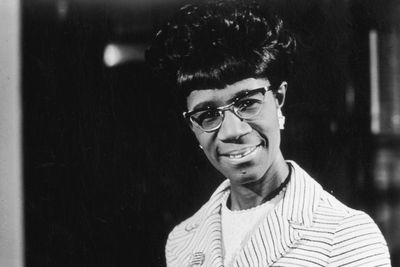As we celebrate Women's History Month, we remember the powerhouse that was Shirley Chisholm
As we celebrate Women's History Month, we'd be foolish not to remember the powerhouse that was Shirley Chisholm. Before Barack Obama, Hillary Clinton, Stacey Abrams, and Kamala Harris; there was Shirley. While many are familiar with Chisholm being the first African American to run for President of the United States, she's accomplished much more than that.
In fact, many would say Chisholm was among the first women to shatter the elusive glass ceiling, paving the way for a new generation of women to make their mark.
In 2021, it's routine - if not encouraged - for women to run for office. In 1972, it was remarkable. Having a woman run for President wasn't a part of the societal norms we're familiar with seeing today. It was a different era when a woman's worth was measured by how quickly she could fold her husband's laundry.
(Insert dramatic eye roll here.)
But to have a Black woman run for president? That immediately changed the political landscape.
Born Shirley Anita St. Hill in Brooklyn, New York in 1924, Chisholm displayed a natural talent for academics and activism from an early age. While studying at Brooklyn College, Chisholm advocated for women to run for student government, and petitioned for an African American history curriculum. Without realizing it, Chisholm was laying the groundwork for her political future.
After graduating from Brooklyn College in 1946, Chisholm attended Columbia University's Teachers College, where she received her master's degree in elementary education in 1952. One year later, Chisholm officially began her political career, campaigning for Lewis Flagg Jr. to become Brooklyn's first Black judge.
READ: As we celebrate Black History Month, we cannot forget about the legacy of Coretta Scott King
Like her husband, Coretta Scott King was a visionary to be reckoned with, championing for justice and equality long after her husband was gone
While campaigning for Flagg Jr., Chisholm fought for economic empowerment and civil rights through her involvement with the Belford-Stuyvesant Political League. Continuing her advocacy towards gender and racial equality, Chisholm participated in the League of Women Voters, the Brooklyn Democratic Clubs, and the Unity Democratic Club.
With enough time spent immersing herself within the Brooklyn political scene, Chisholm decided to run for the New York State Assembly in 1964. Shortly after, Chisholm won a seat in New York's 12th congressional district, becoming the first Black woman elected to the U.S. House of Representatives. Earning the nickname "Fighting Shirley," Chisholm was an active House member, introducing more than 50 pieces of legislation catering to racial and gender equality, the plight of the poor, and ending the Vietnam War.
In 1971, Chisholm became co-founder of the National Women's Political Caucus, and became the first Black woman and second woman ever to serve on the House Rules Committee in 1977. In addition, Chisholm was a staunch pioneer for reproductive rights. In 1969, she was named the honorary co-president of the National Association for the Repeal of Abortion Laws (NARAL), became a co-founder ofthe National Organization for Women (NOW) in 1970, and co-founded African American Women for Reproductive Freedom when she retired from Congress in 1990.
Chisholm also co-founded the National Congress of Black Women.
As inspiring as Chisholm's story is, it isn't exempt from discrimination. Because with every successful woman, there's bound to be a flock of threatened, insecure men not far behind. While campaigning for the 1972 Democratic Party presidential nomination, Chisholm was banned from participating in televised primary debates and was permitted to make just one speech.
In 2015, ten years after her death, former President Barack Obama awarded Chisholm the Presidential Medal of Freedom. There's no denying Chisholm laid the foundation for women to succeed in a predominately male universe. She provided a space for women to be their authentic selves and championed a future where they could thrive unapologetically.
In 1972 Chisholm was quoted saying, "I want history to remember me not as the first Black woman to run for the presidency, but as a Black woman who lived in the 20th century and dared to be herself."
It's safe to say Chisholm accomplished exactly that.
Have you got something to say? Want to see your writing here? Submit a post to Conversations today.
- Why Women's History Month is in March - and how you can celebrate it this year - Indy100 Conversations ›
- Inspiring ways to celebrate Women's History Month—and women all year round - Indy100 Conversations ›
- Elizabeth Blackwell: How she paved the way for women ›
- Moneybagg Yo has responded to Joe Biden's 'Moneybagg Joe' meme— and I can't stop laughing - Indy100 Conversations ›
- Barack Obama gets candid on toxic masculinity with daughters - Indy100 Conversations ›
- A Look Back On Shirley Chisholm's Historic 1968 House Victory : NPR ›
- Shirley Chisholm pioneered the path for Kamala Harris, Biden's ... ›
- Shirley Chisholm, 'Unbossed'Pioneer in Congress, Is Dead at 80 ... ›
- Before Hillary Clinton, there was Shirley Chisholm - BBC News ›
- Shirley Chisholm | National Women's History Museum ›
